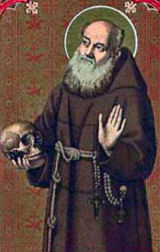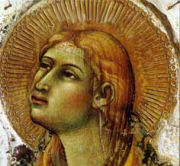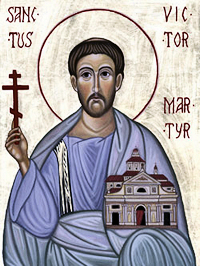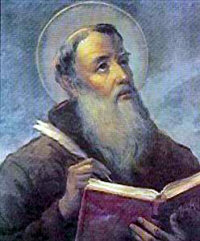Ordinary Time: July 21st
Friday of the Fifteenth Week in Ordinary Time; Optional Memorial of St. Lawrence of Brindisi, Priest and Doctor of the Church
Other Commemorations: St. Praxedes, Virgin (RM); St. Victor, Martyr (RM)
» Enjoy our Liturgical Seasons series of e-books!
Today is the Optional Memorial of St. Lawrence of Brindisi (1559-1619), the first Capuchin Franciscan to be honored as a Doctor. St. Lawrence was born in 1559 at Brindisi, a town located on the Adriatic coast of the heel of Italy. Educated from his youth by the Conventual Franciscan Friars, he acquired great facility in languages and is considered the greatest linguist among the Doctors of the Church. His fields of labor were many: army chaplain, diplomat, leader of the Counter-Reformation in Austria and Bohemia, teacher of Sacred Scripture, exegete and mariologist. St. Lawrence offers priests a wonderful model for their studies and preaching. He was canonized in 1881 by Leo XIII.
The Roman Martyrology today commemorates St. Praxedes (d. 164), whose history is rather obscure. A sixth century account makes her a sister of St. Pudentiana and a daughter of the senator Pudens, which would place her life around the origin of the Church in Rome. As a single laywoman she was generous in sharing her wealth with the works of Church of Rome, and also living a life of virtue, especially charity for others.
Also commemorated is St. Victor (d. 290), a distinguished soldier of war who was both born of a noble family and had distinguished himself in bravery through many military campaigns. These are the acts of his heroic martyrdom where despite torture, imprisonment, and public ridicule the Romans where unable to get him to offer sacrifice to false gods even when they tried to force him under restraint to do so. During his ordeal of being tortured and despised St. Victor said he would still eagerly embrace any lawful command that the emperor gave, but he steadfastly refused to do what was sinful.
St. Lawrence of Brindisi
 His name was Julius Caesar, and he was born at Brindisi in the kingdom of Naples in 1559. Educated in Venice at the College of St. Mark, he entered the Capuchins and was given the name Lawrence. Finishing his studies at the University of Padua, he showed a flair for languages, mastering Hebrew, Greek, German, Bohemian, Spanish, and French, and showed an extraordinary knowledge of the text of the Bible.
His name was Julius Caesar, and he was born at Brindisi in the kingdom of Naples in 1559. Educated in Venice at the College of St. Mark, he entered the Capuchins and was given the name Lawrence. Finishing his studies at the University of Padua, he showed a flair for languages, mastering Hebrew, Greek, German, Bohemian, Spanish, and French, and showed an extraordinary knowledge of the text of the Bible.
While still a deacon, St. Lawrence of Brindisi became known as an excellent preacher and after his ordination startled the whole of northern Italy with his amazing sermons. Sent into Germany by the pope to establish Capuchin houses, he became chaplain to Emperor Rudolf II and had a remarkable influence on the Christian soldiers fighting the Muslims when they were threatening Hungary in 1601. Through his efforts, the Catholic League was formed to give solidarity to the Catholic cause in Europe. Sent by the emperor to persuade Philip III of Spain to join the League, he established a Capuchin friary in Madrid. He also brought peace between Spain and the kingdom of Savoy.
His compassion for the poor, the needy, and the sick was legendary. Elected minister-general of his order in 1602, he made the Capuchins a major force in the Catholic Restoration, visiting every friary in the thirty-four provinces of the order and directing the work of nine thousand friars. He himself was a dominant figure in carrying out the work of the Council of Trent and was described by Pope Benedict XV as having earned "a truly distinguished place among the most outstanding men ever raised up by Divine Providence to assist the Church in time of distress."
In 1619, he undertook a journey to see King Philip III of Spain on behalf of the oppressed people of Naples who were ruled by a tyrannical governor. Lawrence reached Lisbon where the king was residing, and it was there that his last illness overtook him. His body was carried back to Spain and buried in the church of the Poor Clares at Villafranca del Bierzo.
Lawrence was canonized by Pope Leo XIII in 1881 and declared a Doctor of the Church by Pope John XXIII in 1959.
—Excerpted from The One Year Book of Saints by Rev. Clifford Stevens
Patronage: city of Brindisi, Italy; archdiocese of Brindisi-Ostuni, Italy
Symbols and Representation: leading the Christian army against the Turks; receiving the embrace of the Child Jesus; With the Infant Jesus
Highlights and Things to Do:
- From the Catholic Culture library read:
- Read more about the life of St. Lawrence:
- If you would like to read more about the Doctors of the Church, Fr. Christopher Rengers, O.F.M. Cap. has written an excellent book, The 33 Doctors Of The Church.
St. Praxedes
 A virgin saint from the earliest Christian times who placed her goods and her services at the disposal of the Church! The life of this saint, like that of most other early Christian saints, remains concealed in the obscurities of legend.
A virgin saint from the earliest Christian times who placed her goods and her services at the disposal of the Church! The life of this saint, like that of most other early Christian saints, remains concealed in the obscurities of legend.
Praxedes, it is said, was the sister of St. Pudentiana; she was devoted to the practice of works of mercy, particularly towards martyrs, during the reign of Emperor Antoninus (138-161). "Some she kept in hiding in her house, others she encouraged to profess the faith heroically, and the dead she buried. To those languishing in prison, she brought needed assistance. When she no longer could endure the sight of the cruel oppression to which Christians were subjected, she implored the Lord to take her from this vale of tears if such were His holy will. It was. On July 21 the Lord called and gave her heaven as the reward for her piety and love of neighbor. Her body was placed in the catacomb of Priscilla in the tomb of her father Pudens and her sister Pudentiana."
—Excerpted from The Church's Year of Grace, Pius Parsch
Patronage: Single laywomen
Symbols and Representation: Sponge and cup or basin; two open purses; bunch of leaves or herbs; woman holding a basin in one hand, branches in the other; crown; vessel
Highlights and Things to Do:
- No matter how high a standard of living may prevail, there always remain abundant opportunities for practicing the corporal works of mercy. It is not the Christian approach to leave the physical needs of others, whether in your own community or in a distant country, to state agencies. When did I last with my own hands "clothe the naked....feed the hungry....harbor the harborless"?
- Read more about St. Praxedes:
- St. Praxedes is one of 140 saints of the Colonnade at St. Peter's Basilica. View her statue here.
- See Christian Iconography for images of St. Praxedes.
- Watch this video about the beautiful Basilica of Saint Praxedes in Rome.
- Read more about the Basilica of Saint Praxedes:
St. Victor
 The Emperor Maximian, reeking with the blood of the Thebæan legion and many other martyrs, arrived at Marseilles, where the Church then flourished. The tyrant breathed here nothing but slaughter and fury, and his coming filled the Christians with fear and alarm. In this general consternation, Victor, a Christian officer in the troops, went about in the night-time from house to house, visiting the faithful and inspiring them with contempt of a temporal death and the love of eternal life. He was surprised in this, and brought before the prefects Asterius and Eutychius, who exhorted him not to lose the fruit of all his services and the favor of his prince for the worship of a dead man, as they called Jesus Christ.
The Emperor Maximian, reeking with the blood of the Thebæan legion and many other martyrs, arrived at Marseilles, where the Church then flourished. The tyrant breathed here nothing but slaughter and fury, and his coming filled the Christians with fear and alarm. In this general consternation, Victor, a Christian officer in the troops, went about in the night-time from house to house, visiting the faithful and inspiring them with contempt of a temporal death and the love of eternal life. He was surprised in this, and brought before the prefects Asterius and Eutychius, who exhorted him not to lose the fruit of all his services and the favor of his prince for the worship of a dead man, as they called Jesus Christ.
He answered that he renounced those recompenses if he could not enjoy them without being unfaithful to Jesus Christ, the eternal Son of God, Who vouchsafed to become man for our salvation, but Who raised Himself from the dead, and reigns with the Father, being God equally with Him. The whole court heard him with shouts of rage. Victor was bound hand and foot and dragged through the streets of the city, exposed to the blows and insults of the populace.
He was brought back bruised and bloody to the tribunal of the prefects, who, thinking his resolution must have been weakened by his sufferings, pressed him again to adore their gods. But the martyr, filled with the Holy Ghost, expressed his respect for the emperor and his contempt for their gods. He was then hoisted on the rack and tortured a long time, until, the tormentors being at last weary, the prefect ordered him to be taken down and thrown into a dark dungeon.
At midnight, God visited him by His angels; the prison was filled with a light brighter than that of the sun, and the martyr sung with the angels the praises of God. Three soldiers who guarded the prison, seeing this light, cast themselves at the martyr's feet, asked his pardon, and desired Baptism. Victor instructed them as well as time would permit, sent for priests the same night, and, going with them to the seaside, had them baptized, and returned with them again to his prison.
The next morning Maximian was informed of the conversion of the guards, and in a transport of rage sent officers to bring them all four before him. The three soldiers persevered in the confession of Jesus Christ, and by the emperor's orders were forthwith beheaded. Victor, after having been exposed to the insults of the whole city and beaten with clubs and scourged with leather thongs, was carried back to prison, where he continued three days, recommending to God his martyrdom with many tears.
After that term the emperor called him again before his tribunal, and commanded the martyr to offer incense to a statue of Jupiter. Victor went up to the profane altar, and by a kick of his foot threw it down. The emperor ordered the foot to be forthwith chopped off, which the Saint suffered with great joy, offering to God these first-fruits of his body.
A few moments after, the emperor condemned him to be put under the grindstone of a hand-mill and crushed to death. The executioners turned the wheel, and when part of his body was bruised and crushed the mill broke down. The Saint still breathed a little, but his head was immediately ordered to be cut off. His and the other three bodies were thrown into the sea, but, being cast ashore, were buried by the Christians in a grotto hewn out of a rock.
—Excerpted from Butler's Lives of the Saints
Patronage: against lightning; cabinetmakers; millers; torture victims; Marseilles, France; Davoli, Italy
Symbols and Representation: millstone; man kicking down a pagan altar; windmill
Highlights and Things to Do:
- Watch Saint Victor Martyr Of The Roman Legion.
- Read more about St. Victor:
- See Christian Iconography for images of St. Victor.






